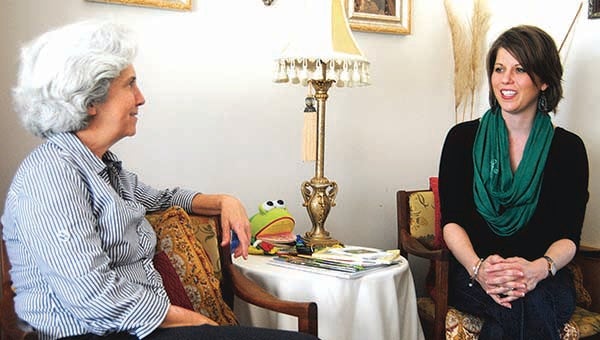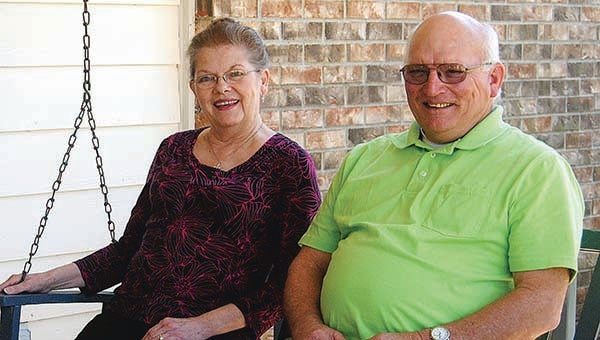Not just on Easter: Dickerson Place offers hope of new beginnings all year long
Published 10:40 pm Saturday, April 19, 2014

DAILY LEADER / KIM HENDERSON / Campus Director Joyce Wilson and Jessica Bullock, case manager, coordinate plans for the upcoming week at Dickerson Place, one of seven residential child care facilities in Mississippi operated by The Baptist Children’s Village.
It’s calm right now in the O’Neal Home, a ranch-style one story on the grounds of Dickerson Place. The kitchen is empty and a long dining table is cleared except for a bowl of fruit. A free-standing fireplace, enjoying a break after recent months of heavy use, separates that spot from a large living room filled with navy blue couches and sunshine coming from banks of windows on both sides.
The setting outside the home’s blond brick walls is equally serene – acres of mown grass, smatterings of pines, lawn chairs left lonely by the edge of a pond. Come 2:30 p.m., though, Darwin Peoples will head to Brookhaven in a 15-passenger van for the after-school pick up, and when he returns with the facility’s current 10 residents, things will definitely “liven up,” according to his wife and fellow houseparent, Linda.
And while the Peoples oversee the girls’ residence, six other staff members, including Campus Director Joyce Wilson, Case Manager Jessica Bullock, and rotating shifts of houseparent couples, round out the team doing ministry at Dickerson Place, a campus of The Baptist Children’s Village located near the Lincoln/Lawrence county line.

Darwin and Linda Peoples (right) have served as houseparents to children at Dickerson Place for six years.
Children age 2 to 20 arrive at the rambling, rural campus one of two ways – either through the Mississippi Department of Human Services or by the voluntary request of a legal guardian. Most newcomers have struggled with some type of abuse – sexual, physical, emotional – or witnessed it. Some have suffered from neglect. Nearly all come from within a 50-mile radius and will stay an average of four years.
Once there, placements spend time with Bullock, who works to develop a plan of care not only for the child, but for the child’s family.
“We try to make goals and help families reach them,” she explains. “We want the children to maintain contact with their families, and we focus on repairing and rebuilding relationships.”
Because Dickerson Place accepts no government funding, Bullock is able to counsel residents and their families from a biblical perspective. “I can offer them all the coping skills in the world, but unless I can point them to Christ, it will be of no use,” she says, acknowledging that in the end, only God can do the work of changing hearts.
“We consider ourselves to be seed planters. We may not see the seeds sprout and grow while a child is here, but we can hope that years later they will remember what they were taught.”
The task of teaching independent living skills falls to house parents like the Peoples. They make sure everyone has chores to complete, like laundry, kitchen cleanup, and lawn maintenance. The couple also helps with homework and makes sure the children get to the dentist, band practice, and church three times a week.
“We try to steer them toward the future,” Linda adds, pointing to the “future and a hope” words of Jeremiah 29:11 painted on a wall hanging near the kitchen. The future most often means the children will move on.
“After you’re with these kids day in and day out for a year or more, you get attached, even if you’ve had trouble with them. It’s hard to see them go,” Darwin admits. Typically, the child is returned to his family or another relative. Sometimes, though not often, a child is adopted when there is no possibility of returning home.
Wilson will mark her 30th year as campus director in 2015, and she grows quiet when asked about changes she’s seen in social work through the decades. “I wish I could say in the future there will be no need for the Baptist Children’s Village because families would be OK,” she says. “We’ve made wonderful strides in technology and so many medical breakthroughs, but in the area that matters most – the family – we’ve taken steps backwards.”
The sound of a clock ticking in the O’Neal Home resonates as Wilson speaks, adding emphasis to a point she makes about the importance of routine for their residents. Once students get home from school, there will be a snack (from the fruit bowl), homework, and some free time before supper, which is usually served around 6 p.m.
On a guided tour of the 5,000-square-foot dwelling, Wilson showcases some efforts of local volunteers. “Brookhaven’s Junior Auxiliary painted this bedroom. Another ladies group provided the bed sets,” she says, adding that Phi Theta Kappa members from Co-Lin led a “canvas for kids” project that left participants with a personalized piece of art to hang above their beds.
Back at their offices, Wilson and Bullock describe a day last January when a former resident, now a husband and father with two children of his own, paid the campus a visit.
“He thanked us, and he told the children that when he was here he used to think, ‘What is God doing to me?’ He said he finally came to realize the better question was ‘What is God doing for me?'”
Bullock says that staff members at Dickerson Place cling to moments like those, when they hear that one of their former residents is doing well. “That’s how I keep going,” she says, “knowing that God is using us.”
Wilson stresses that the same Easter hope that applies to residents at their campus is a reality for everyone. “Things that happen in the past don’t have to weigh us down and keep us trapped as victims. We believe that through Christ there’s hope to go beyond that to God’s purpose for our lives.”

